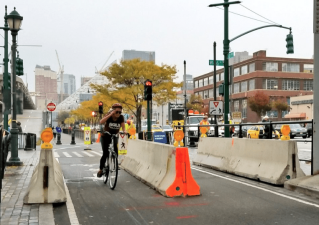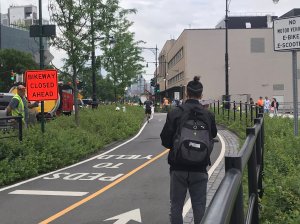Hudson River Park Trust’s Pier 57 Will Add to Car/Bike Greenway Conflicts

A plan from the Hudson River Park Trust to transform Pier 57 into a retail and food market will add 75 parking spaces and a two-lane driveway to the park between 17th and 14th Streets, creating new points of conflict where people biking on the Hudson River Greenway will have to contend with cars crossing the path.
The crossings will have traffic signals with separate phases for cyclists and drivers, and will include speed tables to bring crossing vehicles up to greenway level. Crossings at 14th Street, where traffic exits the driveway, and 16th Street, where southbound 11th Avenue drivers will use a dedicated turn lane to access the driveway, will both have speed tables.
The widest crossing, at 17th Street, where the Chelsea Piers driveway ends and the Pier 57 driveway will begin, will not have a speed table.
“At the end of the day, having any driveways crossing the greenway is a safety problem,” said Noah Budnick of Transportation Alternatives. As an alternative to adding new crossings on the Greenway, Budnick pointed to the Goldman Sachs driveway on West Street between Murray and Vesey Streets, where the bikeway and sidewalk run between the street-side driveway and the building entrance.
The Pier 57 project also includes 75 parking spaces on the basement level of the pier, with access from the driveway across the sidewalk. “There’s no need for parking there,” Budnick said, adding that it will only serve to generate traffic and “increase the number of people driving across the greenway.”
The Pier 57 spaces will not be open to the public and instead will be reserved for those with business at the pier, according to Christine Berthet, co-chair of Community Board 4’s transportation committee. “Contrast that with Chelsea Piers,” she said, with its large public parking garage.
The project has already received a supportive vote from CB 4 after developers adjusted plans to address earlier feedback from the board. The project is now before the City Planning Commission, which next meets on February 6.
Pier 57 was built originally as a passenger and cargo terminal for Grace Lines in the 1950s, later serving as an MTA bus depot from the late 1960s until 2004, at which point it became a temporary NYPD detention center during the Republican National Convention. Since then, it has remained unused. Along with other projects like Pier 40, the Hudson River Park Trust will use revenue from Pier 57 to help fund park maintenance.
Berthet said that the way the Hudson River Park Trust has used projects with on-site parking to support the park creates problems for park users. “The more you build, the more you’re going to need vehicular crossings,” she said. “The more we build on those piers, the more we are making the greenway and the park unusable.”

